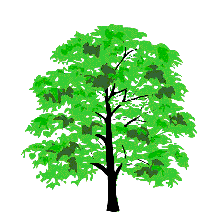 |
Forest Flora
of Hyderabad State - by M Sharfuddin Khan
|
| Main_Menu | Back to Family |
|
Botanical Name - Bauhinia purpurea ----- B. purpurea, Linn. ; F.B.I. II-284. Brandi's Ind. Trees, 258. Gamble's Ind. Timbers, 283. Vern. Deva-kasia, Pedda-ari, Tel. Kanchan, Mar. ----- A moderate-sized, evergreen, usually bushy tree, Bark ash-coloured to dark-brown, young parts covered with brown pubescence. Leaves 3-6 in. long, rather longer than broad, 9-11-nerved, cordate, less frequently truncate, coriaceous, cleft 1/3 - 1/2 way down ; lobes usually sub-acute, often overlapping along the inner margins. Flowers deep rose, in paniculate or corymbose few-flowered racemes ; pedicles bracteolate, 1/3 - 2/3 in. Calyx-tube, 1/4 - 1/2 in., limb 3/4-1 in. cleft to the base in 2 reflexed segments, one emarginate, the other 3-toothed. Petals oblanceolate, long-clawed, reddish. 1 1/2-2 in. long, narrowed at the base with a distinct mid-rib and fine straight lateral veins. fertile Stamens 3-4. Pod 6-12 by 3/4-1, in., on a tomentose stripe or stalk, 1/2-1 in. long, firm, flat, slightly decurved, greenish-purple, glabrous, late in dehiscing ; Seeds 12-15. ----- Frequently met with in all the forests and also in cultivation in gardens. An ornamental tree with large deep rose-coloured fragrant flowers, which appear in the cold season among the foliage. The wood is of a pinkish-white colour turning dark-brown on exposure, moderately hard and durable used for agricultural implements, but seldom large enough for building. The bark is used in tanning, the leaves for cattle fodder and the flower buds are eaten, cooked or pickled. Flowers in cold season. Fruit about February and March.
|